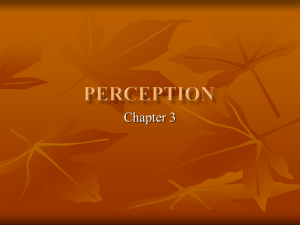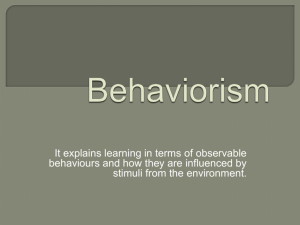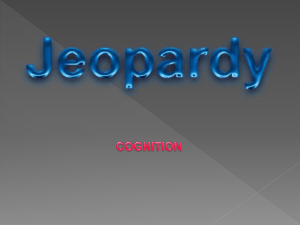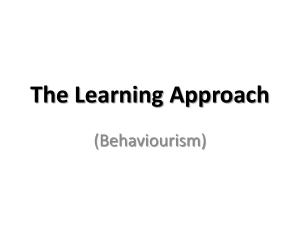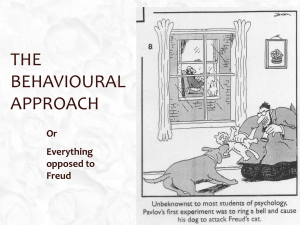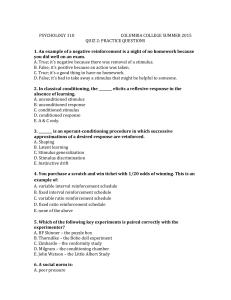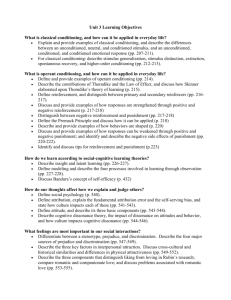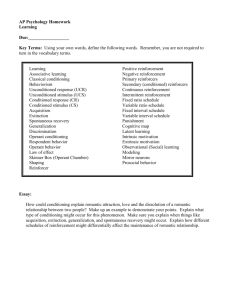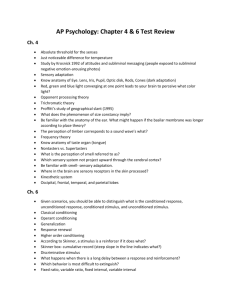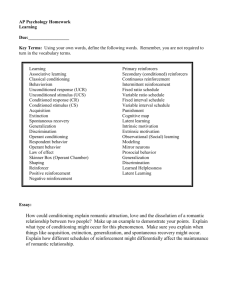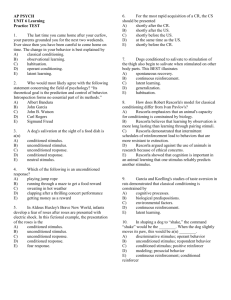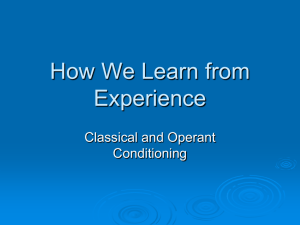HSP3M Introduction to Anthropology, Psychology and Sociology
advertisement
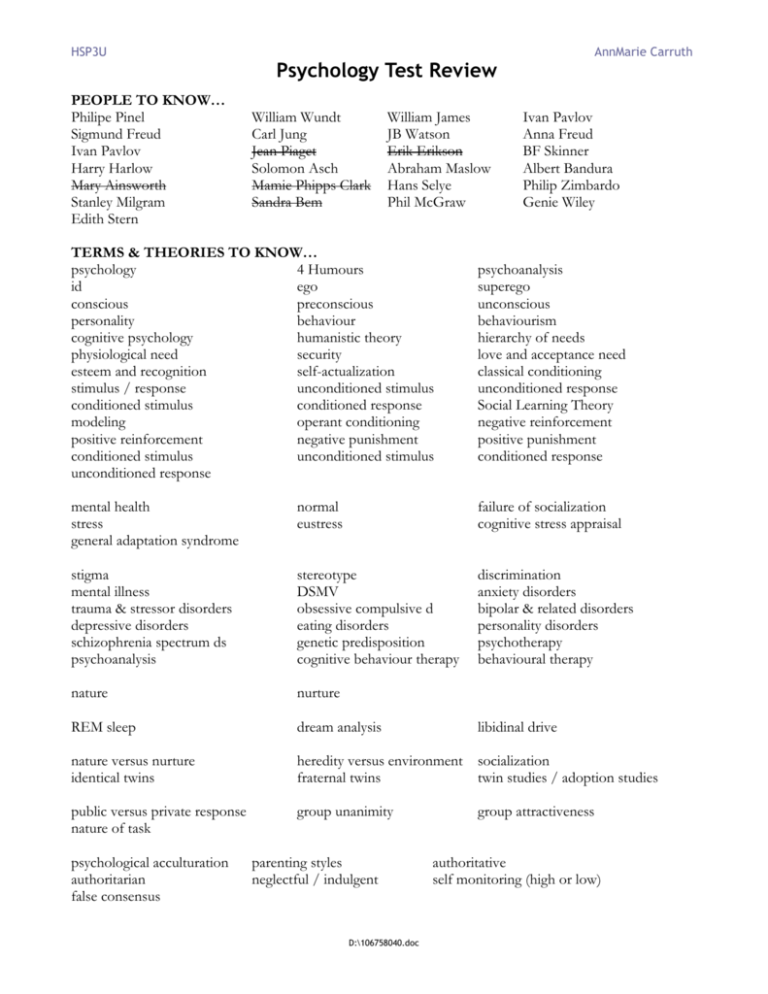
HSP3U AnnMarie Carruth Psychology Test Review PEOPLE TO KNOW… Philipe Pinel Sigmund Freud Ivan Pavlov Harry Harlow Mary Ainsworth Stanley Milgram Edith Stern William Wundt Carl Jung Jean Piaget Solomon Asch Mamie Phipps Clark Sandra Bem William James JB Watson Erik Erikson Abraham Maslow Hans Selye Phil McGraw TERMS & THEORIES TO KNOW… psychology 4 Humours id ego conscious preconscious personality behaviour cognitive psychology humanistic theory physiological need security esteem and recognition self-actualization stimulus / response unconditioned stimulus conditioned stimulus conditioned response modeling operant conditioning positive reinforcement negative punishment conditioned stimulus unconditioned stimulus unconditioned response Ivan Pavlov Anna Freud BF Skinner Albert Bandura Philip Zimbardo Genie Wiley psychoanalysis superego unconscious behaviourism hierarchy of needs love and acceptance need classical conditioning unconditioned response Social Learning Theory negative reinforcement positive punishment conditioned response mental health stress general adaptation syndrome normal eustress failure of socialization cognitive stress appraisal stigma mental illness trauma & stressor disorders depressive disorders schizophrenia spectrum ds psychoanalysis stereotype DSMV obsessive compulsive d eating disorders genetic predisposition cognitive behaviour therapy discrimination anxiety disorders bipolar & related disorders personality disorders psychotherapy behavioural therapy nature nurture REM sleep dream analysis nature versus nurture identical twins heredity versus environment socialization fraternal twins twin studies / adoption studies public versus private response nature of task group unanimity psychological acculturation authoritarian false consensus parenting styles neglectful / indulgent D:\106758040.doc libidinal drive group attractiveness authoritative self monitoring (high or low) HSP3U AnnMarie Carruth QUESTIONS TO REVIEW… 1. What is psychology and how does it differ from the disciplines of anthropology and sociology in terms of helping us understand what shapes human behaviour? 2. Briefly, what are the three main ways according to psychologists that humans learn? 3. What is the difference between classical and operant conditioning? 4. Briefly define or differentiate between the following terms… unconditioned stimulus, unconditioned response, conditioned stimulus and conditioned response. Identify which of the four each of these are… a) your mouth watering while at the dinner table on any given day when food is in front of you is____________________________ b) having several positive experiences with thanksgiving dinner causes your mouth to water just thinking about thanksgiving. This is a ___________________________ c) Thanksgiving dinner is the ____________________________ i) ii) iii) You get yelled at causes you distress, this would be a ________________________ Every time the phone rings at home you get yelled at by your mother who is convinced your friends are losers. Being jumpy or edgy when you are at someone else’s house and the phone rings is a ____________________________ The phone ringing at your friends house is an example of _______________________________ 5. What is positive reinforcement? What is negative reinforcement? Why is punishment not the same thing as negative reinforcement? 6. Why is it important to know about observational learning? What would Bandura think about today’s video games and today’s movies? 7. Identify which learning theories (of the 3) best explain how we would learn each of the following behaviours … a) soccer b) to fear or enjoy going to the dentist c) fear a spanking d) knowing which behaviours impress the teacher e) how a pop machine works f) practicing the piano 8. What kinds of reinforcements are provided for the following behaviours… a) answering questions in class b) eating your favourite food c) getting good grades in school 9. What is the difference between biological and social motivation for behaviour? 10. According to Freud what are the forces or motivations that help direct human behaviour? Further, what is the id, ego and superego? Why is the unconscious mind important? What causes mental illness? D:\106758040.doc HSP3U AnnMarie Carruth 11. According to Maslow, what are the forces or motivations that help direct human behaviour? What is the hierarchy of human needs? What does the term universal mean with regard to this theory? 12. If you go to the movies with your friends which level on Maslow’s Hierarchy are you fulfilling? a)What about if you kill someone in self defense? b) Need to have your supper at the same time each day? c) Read a book about how to be a more complete person? d) Get up on the bus on the way home and start burping really loudly? 13. Do you think Maslow supports nurture over nature or nature over nurture? What about Freud? Can you explain how they include both nature and nurture in their theories? 14. What is stress cognitive appraisal and how can it help a person to cope with stress more effectively? 15. According to Hans Selye what are the stages of long term stress? How can stress sometimes be a positive? Know the three stages. 16. Be able to discuss the differences between nature and nurture or heredity versus environment. Which are influential? 17. What are the differences between Edith and Genie potentially genetically? Also, what are the differences for them environmentally? 18. What do the twin / adoption studies show us? 19. According to the sibling studies approximately how much of our behaviour accounts for similarities or differences in character traits? 20. 21. 22. 23. What does socialization have to do with personality development? Who are the primary or most important socializers? Why are they more important than peers early on? What effect if any do the media have? What effects if any does being an immigrant have, on identity development? 24. Briefly list the indicators of mental health. What is stress? How are stress and mental health connected? 25. What is mental illness? What causes it? 26. Know the main types of classifying mental illnesses currently, under the DSMV? How do they differ? 27. What are the most common clusters of disorders re: mental illness in Canada? Which are two less common clusters of disorders? 28. What are the two most common treatments for all mental illnesses? 29. Understand the different treatment approaches. Give an example of each. 30. Understand sleep patterns. How much sleep does the average adult need? How much sleep does the average teen need? 31. What is dream analysis? What are the different theories– psychoanalysis versus cognitive? 32. What connection do the Nuremburg (Holocaust) Trials have with Milgram’s work on obedience? What did Milgram find? 33. What were the results of Asch’s experiment on conformity? Understand the different types of influence connected to conformity. 34. What were the results of Zimbardo’s experiment on the development of social roles,the impact of the media, and prison? D:\106758040.doc
